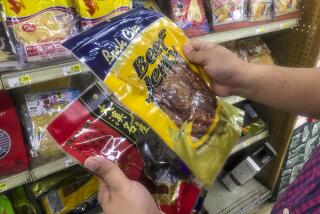45 arrested in Hong Kong on charges of smuggling baby milk formula
- Share via
BEIJING -- Think Hong Kong is joking about the baby food? Better think again.
Customs officials in Hong Kong arrested 45 people on Friday and Saturday on charges of trying to smuggle baby milk powder across the border into China, multiple media outlets reported. The arrests came after an emergency two-can limit on exports of milk formula, launched in February, was made permanent Hong Kong law on Friday.
The South China Morning Post quoted Hong Kong’s secretary for security, Lai Tung-Kwok, as saying that customs agents had arrested 26 Hong Kong residents, 18 mainlanders and one foreign passport holder at border crossings. Lai added that authorities had seized a total of 115 cans of milk powder, with a street value in China of about $4,500.
Some of the alleged smugglers were arrested while trying to carry over milk powder via car at special vehicle-only checkpoints, a tactic seldom used before the limit was in place, officials said.
“On top of random checks on passengers at border checkpoints, customs officers will also be looking closely at vehicles,” Lai said.
Regulations give greater freedom to Hong Kong residents driving to the mainland than vice versa, which may account for the greater proportion of Hong Kong citizens arrested for smuggling in recent days.
The new Hong Kong law stipulates a penalty of up to $64,500 and two years in prison for anyone convicted of breaking the milk powder export limit.
At Hong Kong’s international airport, the public address system informed passengers that they were not permitted to carry out more than two cans of powdered milk formula.
Mainland traders are known in Hong Kong as “locusts,” for stripping store shelves of milk powder and other consumer goods for resale across the border. The booming milk powder trade in Hong Kong was fueled by fears on the mainland that domestically produced baby formula is tainted with industrial chemicals.
Rowdy demonstrations by Hong Kong residents protesting the cross-border consumer-goods trade last year helped turn milk powder into a powder keg threatening relations between Hong Kong and the mainland. Hong Kong parents complain that they are unable to find baby formula for their own children.
The central government in Beijing, gearing up for a large policy conference this month, has repeatedly addressed the milk powder issue in the days following the export ban.
“The milk powder problem is something we don’t need a long time to solve,” China’s health minister, Chen Zhu, said Monday. Chen said the State Council, one of China’s highest policy bodies, is working on solutions.
Hong Kong newspapers have reported that a new food regulatory agency is supposed to be created during this month’s conference.
Last month, Beijing’s city government publicized draft legislation that would restrict sales of milk powder through Beijing-registered online marketplaces. This would only affect a fraction of China’s online commerce, however, and city officials have told Chinese media that they may still revise the law.
Yao Ming, a retired basketball star and currently a member of the Chinese government’s central consultative congress, became one of the latest public figures to address the powder ban in comments he made to the media on Friday.
“From the point of view of the people, we need to show more understanding. Whose family doesn’t have a small kid?” Ming said. “Let the government agencies responsible deal with this -- the people are not guilty.”
ALSO:
Attack on Pakistani Shiites kills at least 30
U.S. to provide $60 million in aid to Syrian rebels
Russia charges that U.S. aid helps Syrian ‘extremists’
More to Read
Sign up for Essential California
The most important California stories and recommendations in your inbox every morning.
You may occasionally receive promotional content from the Los Angeles Times.










